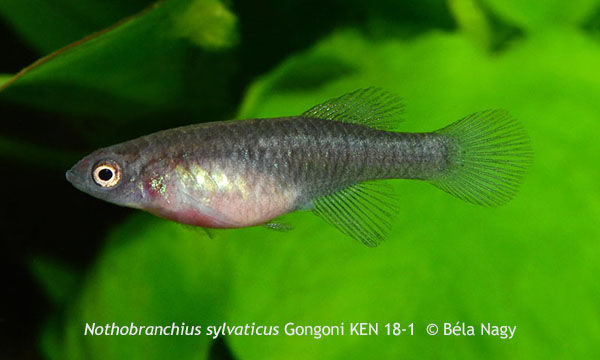
WildNothos
THE NOTHOBRANCHIUS SITE
Nothobranchius sylvaticus Nagy, Bellstedt & Luke, 2025
Bellstedt, D. U., B. Nagy, P. D. W. van der Merwe, F. P. D. Cotterill, Q. Luke & B. R. Watters. 2025. The description of a critically endangered new species of seasonal killifish, Nothobranchius sylvaticus (Cyprinodontiformes: Nothobranchiidae), a relict species from an East African forest refugium in south-eastern Kenya. Zootaxa, 5601 (1): 86–108.
Biotic index

Holotype
NMK, ICH FW/6014/1, male, 33.6 mm SL; Kenya: ephemeral swamp in south-western coastal area; D.U. Bellstedt, 4 July 2018.
Paratypes
NMK, ICH FW/6013/1-2, (8) 4 males & 4 females
Diagnosis
Nothobranchius sylvaticus is distinguished from all other members of the genus by the following combination of characters in males: scales on trunk iridescent light blue covering the entire caudal peduncle; dorsal
portion of head grey with distinct red lobes along supraorbital canal; posterior scale margins on postorbital portion of opercle creating two pronounced brown-red oblique bars; dorsal and anal fins golden, marked with dark grey dots and stripes proximally and medially, merging into uniform dark grey zone distally; caudal fin dark red to red proximally, plain red medially, and with slender black distal band.
Classification
Subgenus: Coastal-Inland Clade
Taxonomic status
Specimens of this species were first collected in December 1982, when P. de Rham discovered a Nothobranchius population inland of the coastal Gazi village in the Gongoni Forest. The population was referred to as N. sp. Gazi (P. de Rham pers. comm.). Later, based on some resemblance in colouration, the population was mentioned as N. elongatus (de Rham, 1991).
During surveys in May 2017 and July 2018 conducted for the Base Titanium mine at Kwale, with the aim to investigate the fish fauna of the Gongoni Forest, D. Bellstedt, Q. Luke, M. Safari and D. Maraba observed and sampled specimens of the unidentified Nothobranchius population in firstly, a seasonal pond in 2017 and secondly, a seasonal swamp habitat in the Gongoni Forest in 2018. In the field, these were referred to as Nothobranchius sp. Southern Kenya, with assigned field codes KEN 17-1 and KEN 18-1, respectively.
The species was retrieved in van der Merwe et al. (2020) as a phylogenetically distinct lineage and referred to there as N. sp. Southern Kenya. Nothobranchius sylvaticus was established as a species by Nagy, Bellstedt & Luke (in Bellstedt et al., 2025).
Type locality
South-eastern Kenya
Distribution
Nothobranchius sylvaticus is endemic to south-eastern Kenya.
Ecoregion
Tana, Athi, and Coastal drainages (567)
Elevation
26 m
Ecology
Water sample taken by P. de Rham in December 1982, revealed the following results: pH = 8.1; conductivity = 465 µS; total hardness = 11.2 °F; carbonate hardness = 7.7 °F; Ca/l = 25.6 mg; Mg/l = 11.7 mg; Cl/l = 98.0 mg; Na/l = 57.0 mg (de Rham, 1991).
Syntopic congeners
None
Reproduction
This species has a semi-annual life cycle.
Embryonic development under captive conditions in peat moss is about two to three months at room temperature.
Size
Maximum size reported: 33.6 mm SL (Bellstedt et al., 2025)
Chromosomes
Karyotype structure unique in the genus.
Etymology
The specific name sylvaticus is a Latin participial adjective and is given in reference to the distinctive habitat preference of the species, restricted to
ephemeral pools and seeps associated with seasonal forest-streams.
Conservation status
Not Evaluated, recommended as Critically Endangered (Bellstedt et al., 2025)
References
De Rham, P. 1991. Safaris poissons au Kenya. Première partie. Aquarama: 31–44.
Bellstedt, D. U., B. Nagy, P. D. W. van der Merwe, F. P. D. Cotterill, Q. Luke & B. R. Watters. 2025. The description of a critically endangered new species of seasonal killifish, Nothobranchius sylvaticus (Cyprinodontiformes: Nothobranchiidae), a relict species from an East African forest refugium in south-eastern Kenya. Zootaxa, 5601 (1): 86–108.

Nothobranchius sylvaticus Gongoni KEN 18-1, male - Copyright Béla Nagy

Nothobranchius sylvaticus Gongoni KEN 18-1, female - Copyright Béla Nagy
Distribution map

Collecting period